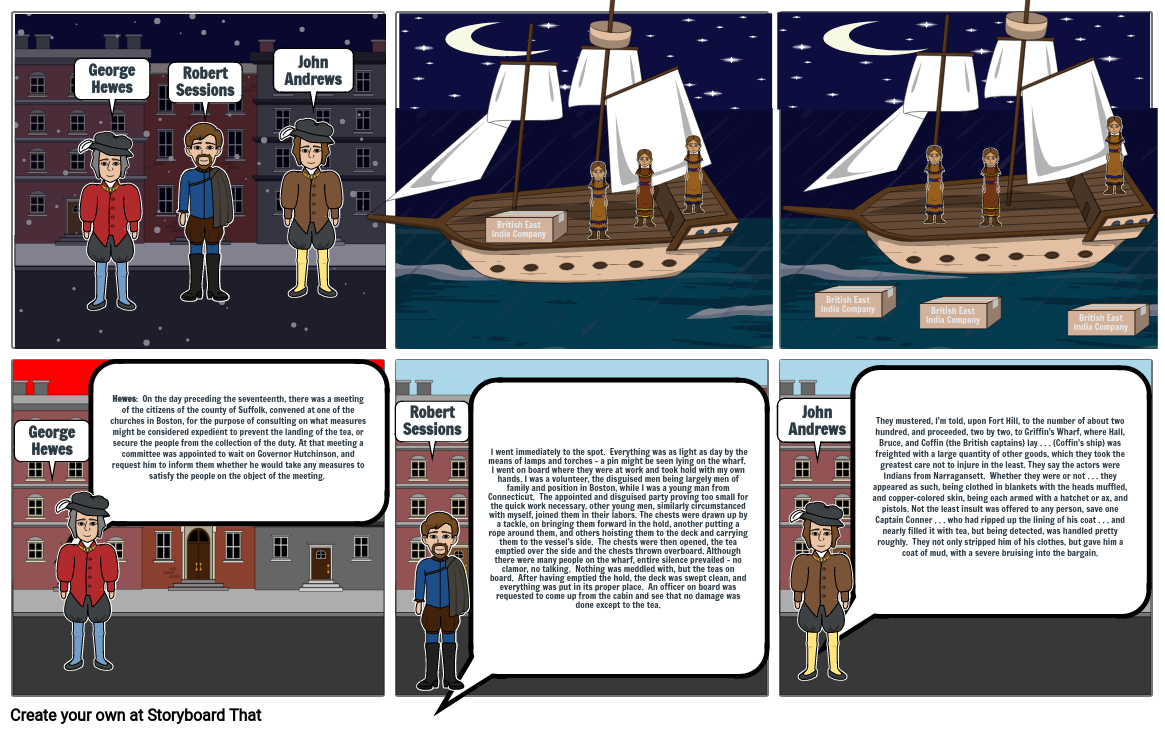Levi beckham Boston tea party

Storyboard Tekst
- George Hewes
- Robert Sessions
- John Andrews
- British East India Company
- British East India Company
- British East India Company
- British East India Company
- George Hewes
- Hewes: On the day preceding the seventeenth, there was a meeting of the citizens of the county of Suffolk, convened at one of the churches in Boston, for the purpose of consulting on what measures might be considered expedient to prevent the landing of the tea, or secure the people from the collection of the duty. At that meeting a committee was appointed to wait on Governor Hutchinson, and request him to inform them whether he would take any measures to satisfy the people on the object of the meeting.
- Robert Sessions
- I went immediately to the spot. Everything was as light as day by the means of lamps and torches – a pin might be seen lying on the wharf. I went on board where they were at work and took hold with my own hands. I was a volunteer, the disguised men being largely men of family and position in Boston, while I was a young man from Connecticut. The appointed and disguised party proving too small for the quick work necessary, other young men, similarly circumstanced with myself, joined them in their labors. The chests were drawn up by a tackle, on bringing them forward in the hold, another putting a rope around them, and others hoisting them to the deck and carrying them to the vessel’s side. The chests were then opened, the tea emptied over the side and the chests thrown overboard. Although there were many people on the wharf, entire silence prevailed – no clamor, no talking. Nothing was meddled with, but the teas on board. After having emptied the hold, the deck was swept clean, and everything was put in its proper place. An officer on board was requested to come up from the cabin and see that no damage was done except to the tea.
- John Andrews
- They mustered, I’m told, upon Fort Hill, to the number of about two hundred, and proceeded, two by two, to Griffin’s Wharf, where Hall, Bruce, and Coffin {the British captains} lay . . . {Coffin’s ship} was freighted with a large quantity of other goods, which they took the greatest care not to injure in the least. They say the actors were Indians from Narragansett. Whether they were or not . . . they appeared as such, being clothed in blankets with the heads muffled, and copper-colored skin, being each armed with a hatchet or ax, and pistols. Not the least insult was offered to any person, save one Captain Conner . . . who had ripped up the lining of his coat . . . and nearly filled it with tea, but being detected, was handled pretty roughly. They not only stripped him of his clothes, but gave him a coat of mud, with a severe bruising into the bargain.
Over 30 millioner Storyboards oprettet

